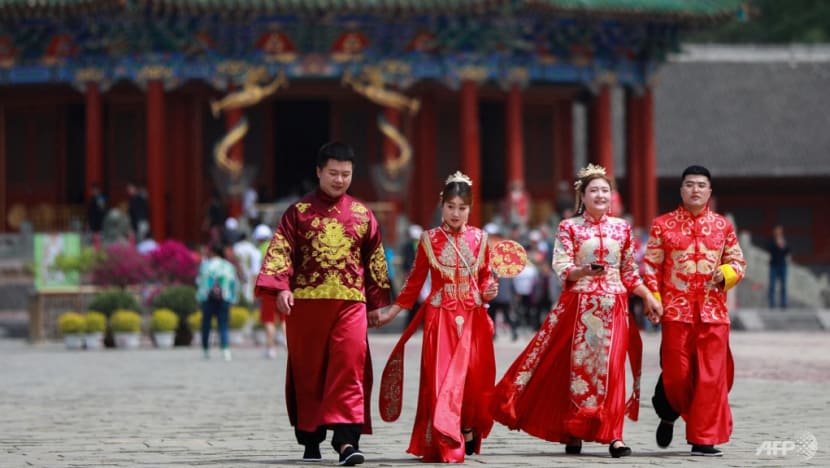Making love a job: China’s first marriage-related degree to open for enrolment, with 70 slots up for grabs
Involving internships at marriage registration offices and matchmaking agencies, the undergraduate programme will train 70 students for a start to provide services “across the entire marriage cycle”, setting them up for possible careers in wedding planning, family counselling and matchmaking.

Couples attend a mass wedding ceremony at the Shenyang Imperial Palace in Shenyang, in China's northeastern Liaoning province on May 22, 2023. (Photo: AFP/STR)
SINGAPORE: China’s first university degree programme devoted to all things marriage will open for enrolment in September, amid a wider push by the government to promote matrimony and shore up flagging birth rates.
The undergraduate course offered by the China Civil Affairs University in Beijing, an institution directly managed by the Ministry of Civil Affairs, will train students to provide skills “across the entire marriage cycle”, local media reported.
The inaugural batch for the so-called “Marriage Services and Management” programme will comprise 70 undergraduates across 12 provinces, taking up modules like sociology, family ethics, and management.
They will also receive practical training in areas including wedding planning, family counselling and matchmaking services, Chinese news site Sixth Tone reported.
Academic training will account for about 45 per cent of the curriculum, with practical training filling out the rest, shared the university’s School of Wedding Culture and Media Arts dean Yu Xiaohui as reported by Sixth Tone.
Besides internships at marriage registration offices and matchmaking agencies, students will get to take part in practice marriage registration and wedding ceremonies on campus.
This specialised major will also focus on “cultivating the students’ ability to solve complex problems related to marriage”, state broadcaster CCTV reported.
According to CCTV, students can take turns playing the role of the marriage registrar, or even the parties getting married or divorced, to better understand the entire process and legal requirements for marriage and divorce.
Speaking to the state broadcaster on Monday (Jul 29), the university’s vice president Zhao Hongguang said graduates can pursue careers in industry associations, marriage agencies, or family and marriage counselling organisations, to name some.
According to Ms Yu, there is currently a lack of highly trained professionals in the wedding and matchmaking industries in China. There has also been increasing demand for people who can provide “sophisticated wedding planning services and design and develop matchmaking services”.
The unveiling of a marriage-related degree comes as the country of 1.4 billion people keeps up a concerted push to encourage marriages and childbirth in turn, especially as the implications of a declining population weigh heavy.
The number of marriages in China has been going down for close to a decade, aside from a post-pandemic rebound in 2023. While the number of newlyweds rose to 7.68 million last year, a 12.3 per cent on-year jump, it’s still far below the peak of 13.47 million couples in 2013.
Marriage rates are closely tied to birth rates. But more women in the country are choosing to stay single, amid record youth unemployment and an economic downturn.
According to official data, China’s single population aged over 15 hit a record 239 million in 2021. That same year, a Communist Youth League survey of about 2,900 unmarried urban young people also found that 44 per cent of women do not plan to marry.
In March, Chinese Premier Li Qiang pledged that the government would work towards "a birth-friendly society and promote long-term, balanced population development", as well as reducing the cost of childbirth, parenting and education.
He said the country would improve policies to boost birth rates by "refining parental leave policies, improving the mechanism for sharing the related labour costs of employers and increasing the supply of childcare services”.
















